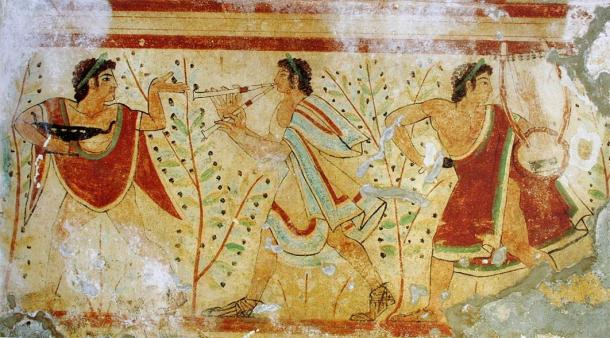In the ancient world, the early distribution of political power was dictated by the availability of fresh water, fertile soil and a temperate climate, all of which were important for the development of organized societies. This greatly clarified the object of politics at the time which was to define boundaries. Ancient Egypt and Mesopotamia were able to equip their large rivers with irrigation systems that allowed higher agricultural productivity and thus sustained surpluses and population growth. The Mesopotamians even innovated the first laws.

Etruscan painting; dancer and musicians, Tomb of the Leopards, Tarquinia, Italy ( Public Domain )
Later, the Greeks began to colonize the Mediterranean region. This facilitated trade, which then caused a shift in the politics of the city-states. In Italy, the Etruscans wielded the most influence until Rome developed into one of the largest cities of the region by the end of the sixth century. Rome’s evolution from a minor power into an imperial behemoth complicated the concept of politics even further. The structure of the early Roman Republic was a hybrid between the Athenian style direct democracy, the Spartan style oligarchy, and the Etruscan style monarchy. This system seemed to be complicated by design to prevent any single entity from gaining too much power.
Politics And Ancient Roman Life
The ancient Roman senate was established in the first days of the city of Rome which was traditionally founded in 753 BC. It was first created as a 100-member advisory committee for the Roman kings. When the Republic was established, the senate became the most powerful governing institution. By the third century BC, influential senators were powerful enough to send troops and negotiate terms of treaties. They also had absolute influence over the Republic’s financial matters.
The ancient Roman tradition strictly distinguished the patricians (the old hereditary elites of Rome) from the plebeians (everyone else). Although the patricians were not necessarily wealthier than the wealthiest of the plebeians, they belonged to noble families and reserved most of the main offices in government.
The two consuls who ruled the Roman Republic, by occupying the highest posts in the government, were elected by the senate which consisted of patricians. Therefore, at least in the early days of the Roman Republic, the plebeians had virtually no say in the government despite still being allowed to vote.
Like this Preview and want to read on? You can! JOIN US THERE ( with easy, instant access ) and see what you’re missing!! All Premium articles are available in full, with immediate access.
For the price of a cup of coffee, you get this and all the other great benefits at Ancient Origins Premium. And – each time you support AO Premium, you support independent thought and writing.
Martini Fisher is an Ancient Historian and author of many books, including ”Time Maps: Gods, Kings and Prophets” | Check out MartiniFisher.com
Top Image : Cicero Denounces Catiline by Cesare Maccari (1888) ( Public Domain )
 RSS Feed
RSS Feed















 November 10th, 2020
November 10th, 2020  Awake Goy
Awake Goy  Posted in
Posted in  Tags:
Tags: 













